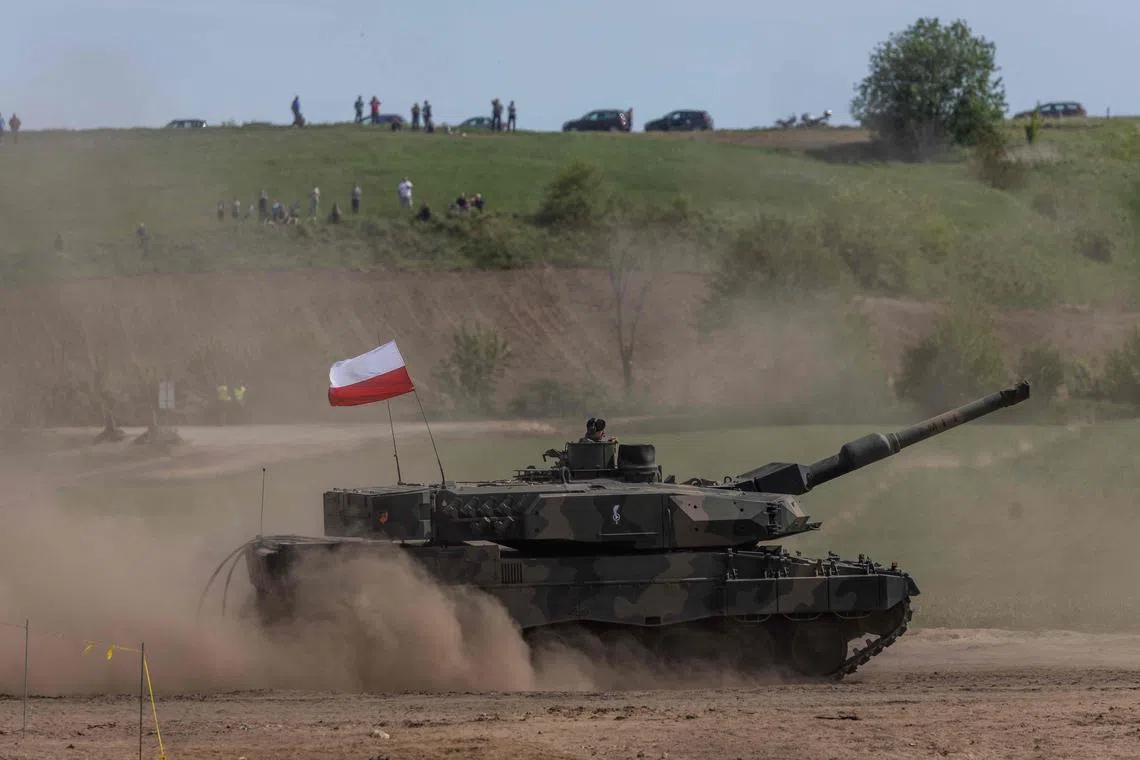News analysis
Ukraine war accelerates shift of power in Europe to the east
Sign up now: Get ST's newsletters delivered to your inbox

A Polish Leopard tank during a military exercise. Poland was a prime lobbyist to try to persuade a reluctant Berlin to send tanks to Ukraine.
PHOTO: AFP
Follow topic:
BRUSSELS – In August, in Prague, German Chancellor Olaf Scholz said it bluntly: “The centre of Europe is moving eastward.”
Russia’s invasion of Ukraine has been a shock to the complacent European order, both to the European Union and to Nato. And it has underscored and enhanced the influence of the countries of Central and Eastern Europe.
Poland and the Baltic states have driven the moral argument to support Ukraine, filling a near-vacuum early in the war, when Europe’s traditional leaders, France and Germany, appeared paralysed. But the war has also brought new urgency and energy for the enlargement of the EU to the Western Balkans and beyond, with offers of candidacy for Ukraine and Moldova.
Vocal pressure from Eastern and Central Europe was crucial to the decisions this week, after months of wrangling and resistance, to give Western tanks to Ukraine.
On Wednesday, Mr Scholz announced that his country would supply some of its Leopard 2 tanks
The war is also accelerating what Mr Scholz implied: that the balance of power in Europe is shifting, too, along with its centre, away from “Old Europe”, which valued and cultivated its ties to Moscow, to the newer members to the east and north, with their raw memories of Soviet occupation and their reluctance to cede chunks of their re-established sovereignty to Brussels.
“Scholz is right,” said Professor Timothy Garton Ash, a European historian at St Antony’s College, Oxford. “The voices of Central and Eastern Europeans are being listened to more and taken more seriously in the councils of Europe, and there is a big eastern enlargement agenda on the table.”
With a major war within its borders, Europe is more about hard power now than before, he said. “So having a Central and Eastern Europe that takes security seriously has an impact.”
Poland has a rapidly expanding military – the government said in 2022 that it planned to double the size of the country’s armed forces – and has ordered a large amount of sophisticated new arms, making it a more important player in both the EU and Nato.
Poland was a prime lobbyist to try to persuade a reluctant Berlin to send German tanks to Ukraine and authorise other countries to do so.
“Power has moved east, and Ukraine will cement this trend,” said Dr Jana Puglierin, Berlin director of the European Council on Foreign Relations. One can extrapolate too much from the Ukraine war, she said, “but you see the clear pattern in moral leadership”.
Central and Eastern European countries, Dr Puglierin said, see themselves as “the freedom fighters in the EU and defending its values, standing up to dictatorship”. They feel vindicated in their long-standing warnings about Russia’s neo-imperialism, its president, Mr Vladimir Putin, and Europe’s dependence on Russian energy – in contrast to what they see as Western Europe’s naïveté about diplomacy and trade with Russia.
Acting early to provide Ukraine military support and to welcome refugees,
Germany and France have also had to confront the failure of their traditional policy of European security with Russia, not against it. French President Emmanuel Macron persists in hoping to be part of any future peace negotiations between Russia and Ukraine, going so far as to talk of giving Russia security guarantees, which has enraged many in Europe, not just in the east.
The war has also made Mr Macron’s aspiration for an “autonomous” European defence seem hollow, given the sharply enhanced role of Nato and the US in the past year.
“The eastern countries are not big fans of EU defence – they want the United States and Nato,” Dr Puglierin said. Germany, too, wants to enhance the trans-Atlantic relationship and depends on Washington, even as it tries to rebuild its own paltry military. “So France will lose some allies and be outnumbered,” she said.
Weakened within Europe, at least for now, France will also be less influential in a more active and aggressive Nato. The alliance is more reliant on American arms and leadership than it was before the war, not less so, and it is expected to expand soon with the new membership of Sweden and Finland.
Germany’s new government, led by Mr Scholz, was unprepared for war, let alone for a sudden cutoff of Russian energy and trade. With rising concern about similar dependence on China, Germany faces the need to reshape its export-driven economy, built on cheap Russian gas and unfettered trade with China.
In the longer run, “the prospect of a larger and more eastern Europe will be a source of great strength for the German economy”, Prof Ash said, with Ukraine representing a vast potential for development. NYTIMES

